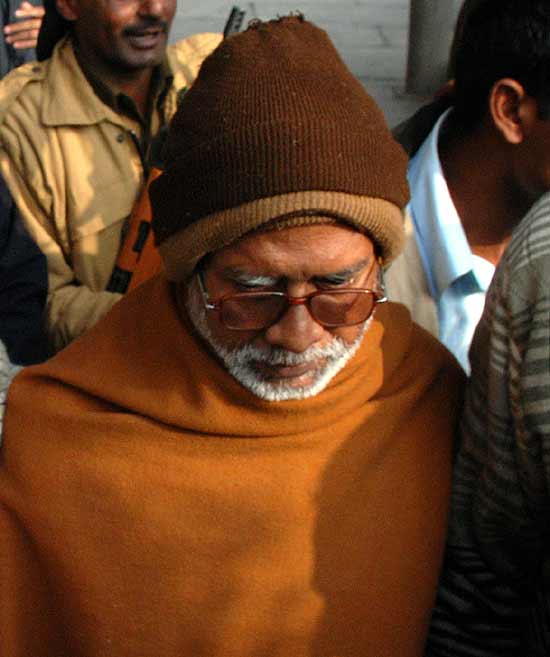Tarique Anwar, BeyondHeadlines
New Delhi: Giving a jolt to the investigating agencies, Rashtriya Swayamsevak Sangh member Swami Aseemanand, who had earlier accepted his involvement in the Mecca Masjid, Samjhauta, Ajmer and Malegaon blasts, on March 29 claimed that his confessional statement was made under “extreme pressure.”
Aseemanand alias Jatin Chatterjee had got recorded his confessional statement before the metropolitan magistrate of Tis Hazari court in Delhi on December 18, 2010.
Manvir Rathi, who represents Aseemanand in the Samjhauta blasts case, claims that on January 3, when his client was produced before the special National Investigation Agency (NIA) court in Panchkula, Aseemanad told him that his statement was recorded by the Central Bureau of Investigation (CBI) in a Delhi court was not voluntary.
Aseemanand has filed his application in the court of the Ajmer chief judicial magistrate.
“Aseemanand has requested the court to reject his earlier application in which he had wished to become a witness in the Ajmer Dargah (shrine) blast case. He has stated that he did not wish to turn a witness,” according to a senior officer of the Rajasthan Anti-Terrorist Squad (ATS).
He said the ATS would be filing a charge sheet against the accused in the Ajmer case on April 8, when it comes up for further hearing.
The Ajmer Dargah attack occurred on October 11, 2007, outside the shrine of highly reverred Sufi Khwaja Moinuddin Chisthi. The blast claimed three lives and injured 28 others as thousands of Muslims were breaking their day-long Ramzan fast.
Terror struck when a bomb went off inside the complex on Thursday evening killing three persons and injuring 28 others as thousands of Muslims were breaking their day-long Ramzan fast.
The officer said that Aseemanand alleged in the court that the investigating agencies were “not letting him hire a lawyer.”
However, the ATS said that the allegation was untrue and that the accused had not been pressurised in any manner.
Meanwhile, Rajasthan’s Additional Chief Secretary (Home) P. K. Deb said that the Ajmer case is likely to be handed over to the NIA as the Central government feels that the same radical groups were involved in Hyderabad’s Mecca Masjid, Malegaon and certain other cases.
“Ajmer Dargah blast case will be handed over to the NIA after the chief minister’s approval. The centre had forwarded to us a proposal for the same some 25 days ago,” Deb said.
“We after discussion with the State Anti—Terrorist Squad (ATS) and the law department forwarded the file to Chief Minister Ashok Gehlot and his approval is expected soon,” he said.
“The centre’s contention was that since the same radical outfits were involved in the blasts in Ajmer Dargah, Hyderabad’s Mecca Masjid and Malegaon, the case should be investigated by the NIA,” the officer said.
The development has brought a major twist in the Samjhauta blasts case after it was earlier reported that Swami Aseemanand confessed that he and several right-wing activists among others were involved in bombings at Muslim religious places since they wanted to answer every Islamist terror act with “a bomb for bomb” policy.
In his confessional statement, Aseemanand also claimed that there was no pressure on him and that he was not tortured or forced by anyone to confess to his role in several blasts cases.
When Rathi was asked why Aseemanand failed to inform the NIA court that his statement in Delhi court was obtained under pressure, the lawyer said, “As defence counsel, it was my duty to counter only those allegations which the NIA will raise during court hearing or produce something in written before court. Until now, the NIA has not produced any such statement by Aseemanand before the court.”
The December 18 statement made under Clause 164 of the Criminal Procedure Code (CrPC) is a legally admissible evidence that makes it crucial for the investigators probing the terror bombings targeting Muslims at religious and other places.
In his confessional statement, Aseemanand, who heads the Vanvasi Kalyan Ashram in Gujarat’s Dangs District, told the magistrate that in a 2006 meeting with other Hindu radicals, including murdered RSS leader Sunil Joshi and Thakur Pragya Singh, it was he who propagated the policy of “bomb for a bomb.”
“He told me that making a bomb is not my job. I have been instructed by the RSS to work with the tribals. He said Sunil Joshi had been given the task of bombs. He said whatever help Sunil needs, we will provide,” Aseemanand was quoted as telling to the CBI in the report published by Tehelka.
“I had also got to know that Sunil Joshi and Bharatbhai had met Indreshji in Nagpur and Indreshji had given a sum of Rs 50,000 to Sunil in Bharatbhai’s presence. Col Purohit had once told me that Indreshji was an ISI agent and that he had all documents to prove his point. But he never showed me those documents,” he said.
Aseemanand, arrested last year, also confessed how he had motivated a bunch of RSS pracharaks and other Hindu radicals to carry out the terror strikes to target Muslims.
Aseemanand’s confession is the first direct evidence of the involvement of Hindutva extremists in the 2006 Malegaon blasts and the Samjhauta Express blast even though there were accusations of their involvement in the Mecca Masjid and Ajmer blasts.























